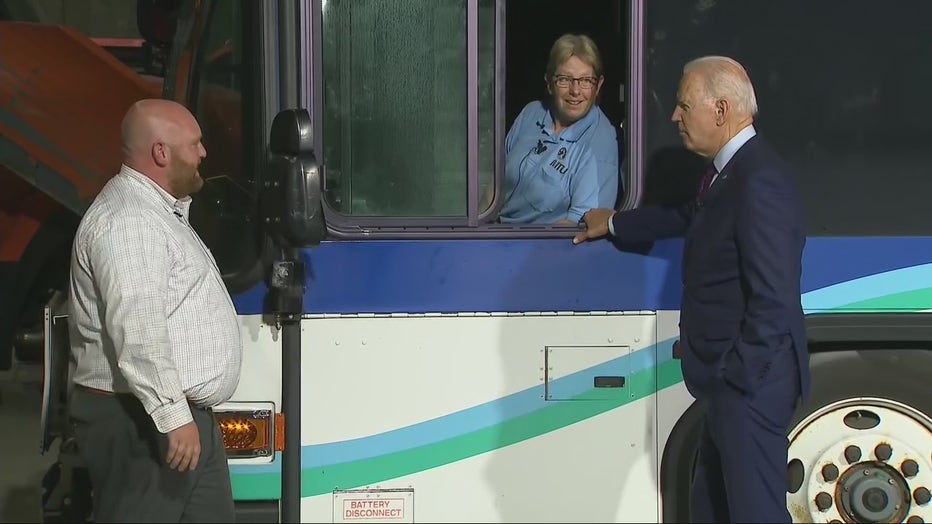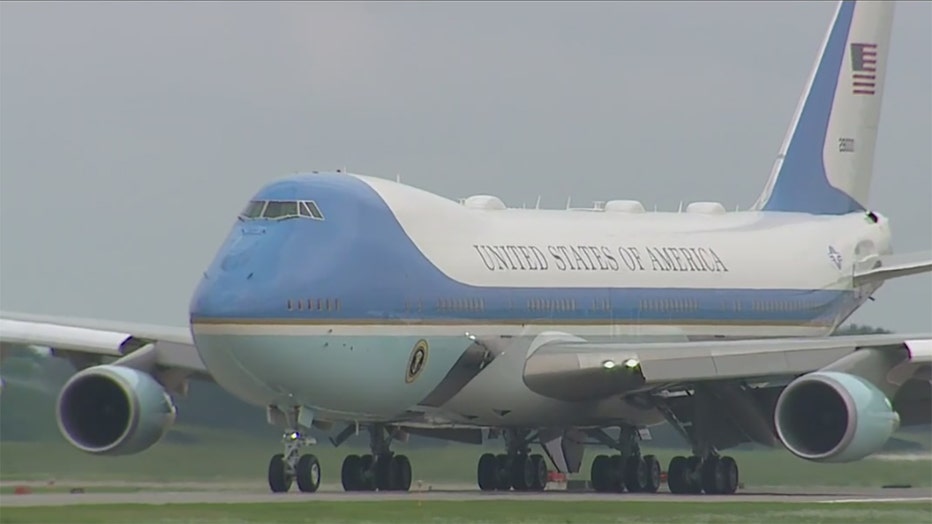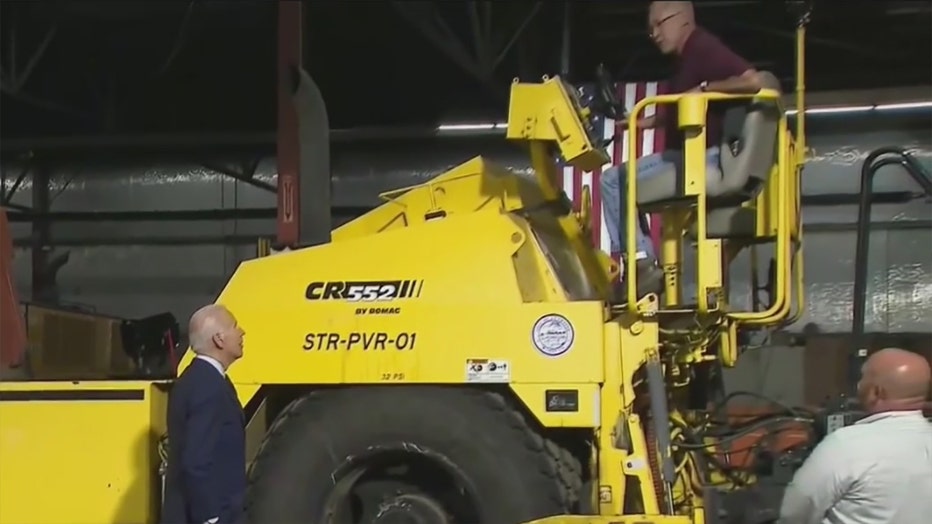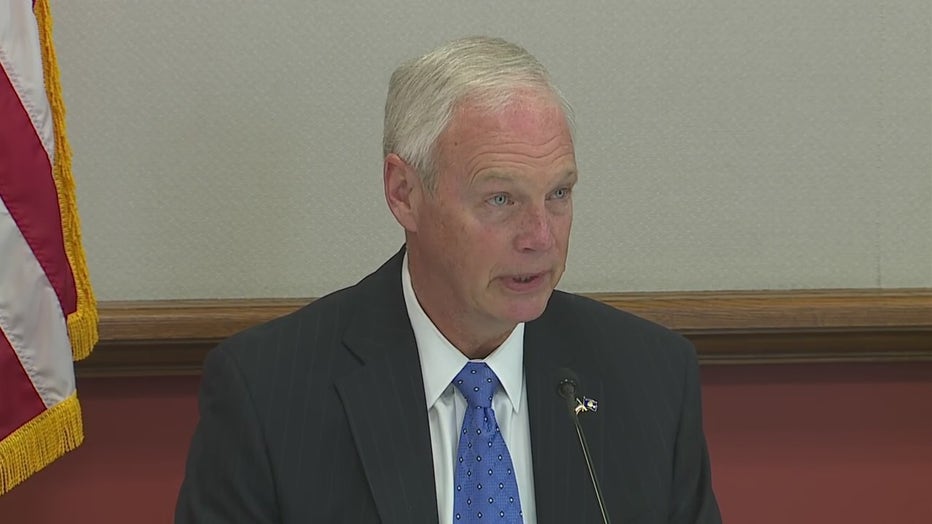Biden in Wisconsin: Infrastructure deal on the docket in La Crosse

Biden in Wisconsin
The president made the pitch in a state he won by 20,000 votes. However, La Crosse sits in the third Congressional District – which he lost.
LA CROSSE, Wis. - President Joe Biden declared there is an urgent need for a "generational investment" in the nation’s infrastructure, as he looked to sell voters Tuesday, June 29 on the economic benefits of the $973 billion bipartisan package that still faces an uncertain future in Congress.
Biden traveled to La Crosse, Wisconsin, population 52,000, and toured its public transit center, highlighting projects — including hybrid buses and road repair equipment — that would receive additional funding from the infrastructure bill. He argued that the package, which is held together in large part by the promise of millions of new jobs, is a way for the U.S. to assert both the principles of democracy and the economic might that can come from dramatic investments in the country’s future.
"America has always been propelled into the future by landmark investments," Biden said, adding that only the government can deliver funding that massive.

President Biden visits La Crosse transit center
He said there is a critical need to improve crumbling infrastructure — from overwhelmed power grids to lead-filled water pipes to traffic-clogged roads — and stressed that a plan needs to be ambitious to not only improve Americans' daily lives now but also to combat the growing challenges of climate change.
"We’re not just tinkering around the edges," Biden said.
FREE DOWNLOAD: Get breaking news alerts in the FOX6 News app for iOS or Android
Message to Wisconsin
"This is a blue-collar blueprint to rebuild America," a White House memo says of the plan.
The visit to La Crosse was indeed a blue-collar political play, with faux traffic construction signs that said "American Jobs Plan" dotted across the venue. The president has long connected with working-class voters, while Wisconsin is one of the trio of Great Lakes states — along with Michigan and Pennsylvania — that Biden narrowly reclaimed for the Democrats after they were captured by Donald Trump in 2016.
"Anytime you get the chance to see a sitting president, we think it’s pretty cool. we thought we’d expose the kids to it," said Aaron Aspenson, who voted for Trump.
"Fourth of July is just around the corner, and what better way to bring in the holiday with seeing the president of the United States here in La Crosse, Wisconsin," Jacque Shay, who voted for Biden, said.

Air Force One arrives for President Joe Biden's visit to La Crosse on June 29, 2021.
The president made the pitch in a state he won by 20,000 votes. However, La Crosse sits in the third Congressional District – which he lost. The district twice voted for Barack Obama, and twice back Trump.
"Milwaukee has more than 160,000 water service lines. More than 70,000 of them, nearly half, have lead service lines," President Biden said. "More than 1,000 bridges here in Wisconsin are rated structurally deficient by engineers."
Wisconsin Republican Sen. Ron Johnson said he's worried about the cost, countering: "Take the $700 billion-plus of the quote-unquote COVID relief package that isn’t even spent until 2022-28, repurpose that money and apply that $700 billion for infrastructure. That would be more than enough."
It is a message shared by a small group of protestors.
"He is here to actually raise our taxes, very dramatically, and it’s going to affect the local businesses and families with this huge so-called infrastructure bill," said protester Laurie Beyta.
And after selling his infrastructure plan to voters in a divided Wisconsin, Biden now heads back to a divided Washington, where he’ll have to convince lawmakers to support this deal.
Questions of bipartisan bill
The visit to Wisconsin, which included Biden reminiscing about driving a bus during law school, was the beginning of what the White House has declared would be a series of presidential trips to sell the bipartisan bill — and to reassure the nervous Republicans who helped craft it.
The process briefly fell into disarray late last week as Biden suggested the deal would be held up until he also received a separate package for infrastructure, jobs and education that would be determined solely by Democrats through the budget reconciliation process.
Biden said Saturday that this was not a veto threat, and by Sunday the package appeared back on track. But there were still anxieties on both sides of the aisle.
Some Republicans have questioned the wisdom of signing onto a bipartisan bill if it is linked to a party-line reconciliation bill that will contain a host of Democratic priorities. And GOP Senate Leader Mitch McConnell, who has often declared his steadfast opposition to the Biden agenda, has questioned the process.

President Joe Biden in La Crosse on June 29, 2021.
Meanwhile, a balancing act awaited among Democrats as well: Some more liberal members of the party have urged Biden to push for a Democrats-only reconciliation bill at least as large as his previously stated $4 trillion goal, while some more moderate members have signaled they’d want a much smaller number. With the Senate deadlocked 50-50, with ties broken by Vice President Kamala Harris, the White House can’t afford to lose a single vote.
As Biden trumpeted the deal in public, the White House also furiously worked behind the scenes to keep it on the tracks.
Senior West Wing aides have had calls this week with more than 60 Democratic and Republican members and chiefs of staff and other aides, White House Press Secretary Jen Psaki told reporters Tuesday aboard Air Force One en route to Wisconsin. And she said the White House was going along with the timeline outlined by Senate Majority Leader Chuck Schumer, who has said he wants to have both packages on the floor for debate next month.
"The president made clear that he is going to work his heart out, getting both bills across the finish line," said Psaki.

President Biden speaks about a $973 billion infrastructure program
President Joe Biden looked to sell voters on the economic benefits of the proposed 973 billion infrastructure package while in Wisconsin on Tuesday.
White House officials have issued an internal memo that highlights how they say the largest investment in transportation, water systems and services in nearly a century would boost growth. The memo notes that the total package is four times the size of the infrastructure investment made a dozen years ago in response to the Great Recession and the biggest since Franklin D. Roosevelt’s New Deal in the 1930s.
It also emphasizes an analysis suggesting that 90% of the jobs generated by the spending could go to workers without college degrees, a key shift as a majority of net job gains before the pandemic went to college graduates.
Potential economic gains were a shared incentive for the group of Democratic and Republican senators who agreed to the deal last week. McConnell said he has not yet decided whether he will support the bipartisan package, but he wants Biden to pressure House Speaker Nancy Pelosi and Schumer to say they will allow the bipartisan arrangement to pass without mandating that the much larger and broader follow-up bill be in place.
"I appreciate the president saying that he’s willing to deal with infrastructure separately, But he doesn’t control the Congress," McConnell said this week.

Sen. Ron Johnson (R-Wisconsin)
The two bills had always been expected to move in tandem, and that is likely to continue as Biden drops his veto threat but reaches across the aisle for the nearly $1 trillion bipartisan package as well as his own broader package. The Democratic leaders are pressing ahead on the broader bill, which includes Biden’s families and climate change proposals, as well as their own investments in Medicare, swelling to some $6 trillion.
One of the Democratic moderates, Sen. Joe Manchin of West Virginia, reiterated Tuesday that he would be amenable to a party-line budget bill but did not address its size.
He told MSNBC that "I have agreed that that can be done."
Republican reaction to the president's visit
"What President Biden needs to learn and acknowledge today is that Wisconsin employers are finding it almost impossible to hire the workers they need because federal unemployment benefits provide an enormous incentive not to work. Biden and his fellow Democrats refuse to acknowledge their socialist policies are creating greater dependency, hampering economic recovery, and further mortgaging our children’s future. Everyone agrees we must invest in infrastructure. Unfortunately, we’ve recently added $6 trillion to our national debt that now exceeds $28 trillion. A fiscally responsible infrastructure bill would use the $700 billion of ‘Covid relief’ spending that isn’t spent in this fiscal year and repurpose that amount for real infrastructure – not new entitlements."
"While President Biden is in Wisconsin today, I hope he takes note of the "Help Wanted" signs across the state. The worker shortage is a direct consequence of costly, inefficient policies from Washington. While Pelosi and Biden’s policies have brought us to this point, Governor Evers can act and end the federal incentive keeping Wisconsin workers at home. The government needs to get out of the way and get workers back to work. I will continue supporting our communities and opposing wasteful, inefficient policies from the Biden administration."
Featured
St. Paul-to-Chicago Amtrak: 2nd daily train expected in 2024
A second Amtrak passenger train that will run between St. Paul and Chicago is expected to begin daily service in 2024, after Minnesota lawmakers set aside $10 million for the project.
Featured
Wisconsin Legislature considers state budget in final votes
Debate over the Republican-written $87 billion state budget begins in the Legislature on Tuesday, with the final votes to send the document to Gov. Tony Evers.



